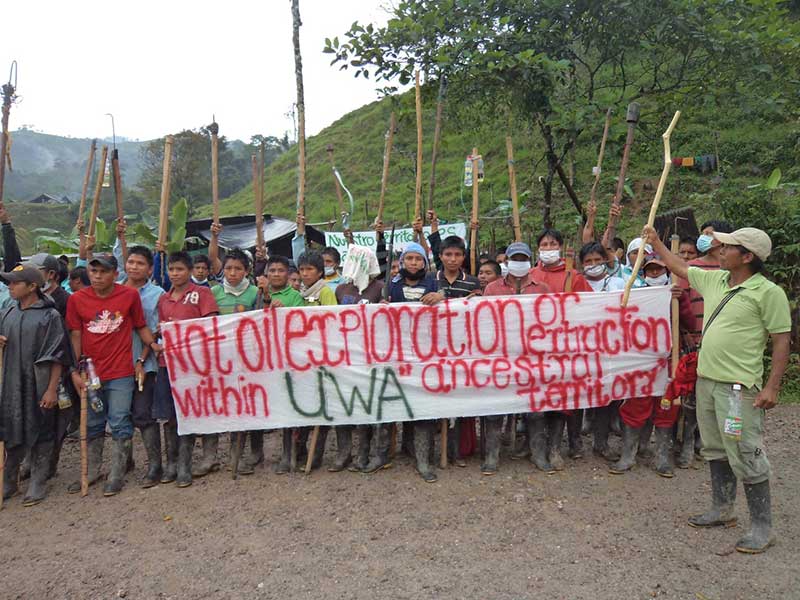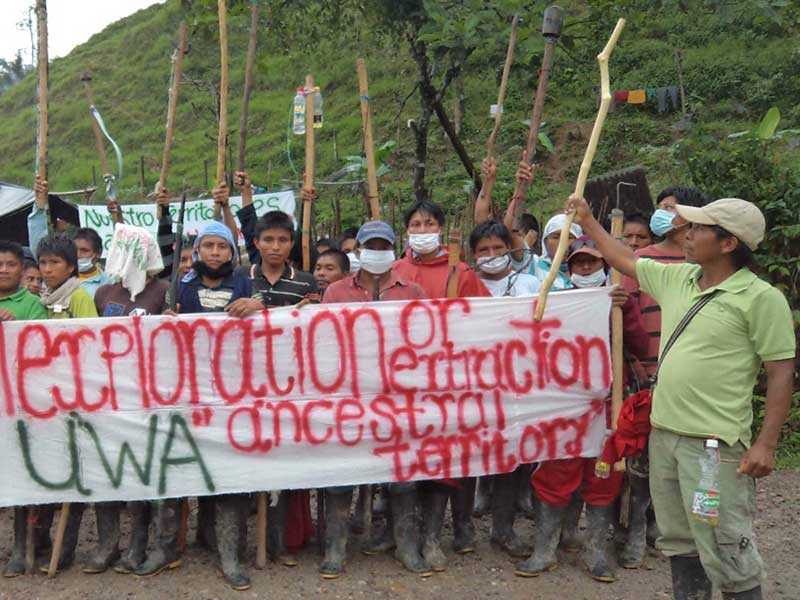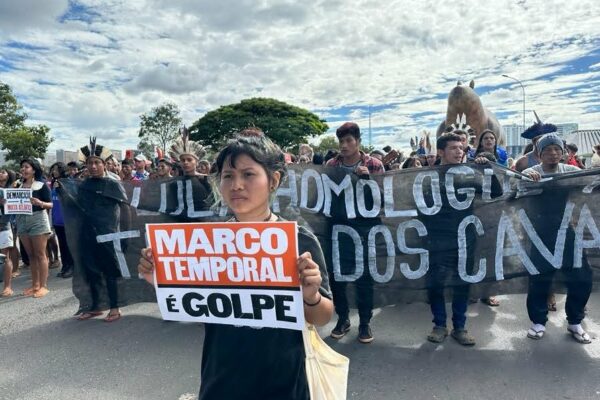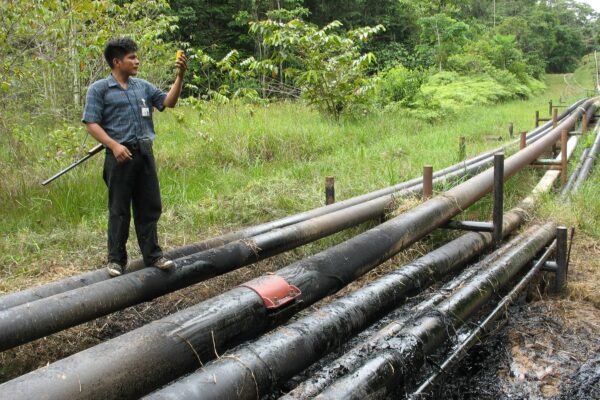
The indigenous U’wa people living in north-east Colombia have won what observers call an “historic” and “decisive” victory after state oil and gas company Ecopetrol dismantled a gas drilling site in their territories.
The U’wa Association of Traditional Authorities and Councils (Asou’wa) reported in February last year the arrival of an “avalanche of heavy machinery” and increasing numbers of soldiers at the site, called Magallanes, where Ecopetrol intended to drill three wells. After statements fiercely opposing operations and a series of meetings with government and company representatives, Ecopetrol agreed to suspend operations last May and announced a decision in July to withdraw equipment – but only finished doing so in January this year.
“It’s a triumph,” Asou’wa vice-president Heber Tegria Uncaria told the Guardian. “It’s one more battle we’ve won over the last 20 to 30 years, and it’s thanks to the U’wa people themselves, national and international support, and the role of the media in drawing people’s attention to what is happening.”
“We feel extremely happy about the Magallanes victory and it gives us strength to continue fighting for our lives, for our rights and for Mother Earth,” says U’wa lawyer Aura Tegria Cristancho. “Ecopetrol’s decision was a very intelligent one. It knows the U’was and knew we wouldn’t stop fighting.”
Asou’wa issued a statement calling Ecopetrol’s withdrawal an “act of respect” for U’wa rights and an “important achievement” in the defence of their territories, and acknowledging the importance of support from organisations and individuals working on human rights and environmental issues, particularly the US-based NGO Amazon Watch.
Andrew Miller, Amazon Watch’s advocacy director, describes Ecopetrol’s decision as a “decisive victory” and says it is “very significant” that “one of Latin America’s largest corporations” would dismantle a gas drilling site following pressure.
“I can’t say this is unprecedented, but we’ve never seen a similar circumstance in the last 20 years,” he says. “Once actual construction starts, it is extremely difficult to force corporations, especially one with the full backing of the state, to reverse course.”
Carlos Andres Baquero, a lawyer from Bogota-based Dejusticia, told the Guardian Ecopetrol’s decision was “historic.”
“It’s been several decades since the U’wa started their fight to protect their territory and although it has not been easy, the withdrawal from Magallanes is a testament to their strength and capacity to mobilise,” he says.
The United Nations’s Special Rapporteur on the Rights of Indigenous Peoples, Victoria Tauli-Corpuz, calls it an “important victory” for indigenous peoples in Colombia.
“Such victories are far too rare,” she told the Guardian. “Too often projects see indigenous peoples driven from their lands. I hope other corporations can draw lessons from these conflicts and obtain the free, prior, and informed consent of indigenous peoples before making use of their territories.”
Camila Mariño, a Colombian lawyer with Earthrights International, describes Ecopetrol’s decision as “in line” with the agreements made with the U’was last May, as well as recent commitments by the government – made during peace talks with Farc guerrillas in Cuba – to take human rights and indigenous communities fully into account.
Asked by the Guardian if it had pulled out of Magallanes because of U’wa opposition, Ecopetrol emailed a statement saying it had agreed to meet with them in June last year but they had failed to show up.
“Since this led to delays, Ecopetrol decided to remove the drilling equipment and facilities from the area, as has effectively happened,” the company states.
However, as Tegria Uncaria points out, Ecopetrol retains its environmental license to operate at Magallanes, and the company itself has called the suspension “temporary.” In correspondence last August Ecopetrol emphasised that suspension “didn’t imply a definite termination of the project”, and told the Guardian it “would like to continue exploring in the area, but respecting the U’wa nation and all the agreements made with them.”
The U’was have now taken legal action to have the environmental license annulled.
“We won the political battle, but the license remains in force,” says Tegria Uncaria.
The Magallanes site is roughly 270ms beyond the northern boundary of a 220,000 hectare reserve established for the U’was in 1999, but remains within their ancestral territories.
Asou’wa warns that, Magallanes aside, the U’was continue to face other serious threats. These include mining concessions in their reserve, the Cano Limon-Covenas oil pipeline which has been attacked 100s of times, and armed conflict between guerrillas, paramilitaries and the Colombian army.
The pipeline, owned by Cenit, an Ecopetrol subsidiary, mainly transports oil from the Cano Limon oil fields in which, says Ecopetrol, it has a 55% stake and US oil firm Occidental has 45%. According to Adam Isacson, from the Washington Office on Latin America (WOLA), some of the US’s multi-billion dollar “Plan Colombia” “aid” package – ostensibly about combating the drugs trade – has been spent on Colombian army brigades in this region in order to protect the pipeline, with the “bulk of it” going to “Black Hawk helicopters, pilot training, maintenance training, communications equipment and fuel sustenance.” According to a 2011 WOLA report co-authored by Isacson, “Plan Colombia” aid was delivered during a period of “severe human rights abuses” by security forces and paramilitary and army violence spiralling “tragically upwards”, while US officials, he says, “downplayed human rights groups’ constant warnings about military-paramilitary collaboration” and the “false positives” scandal in which Colombian soldiers dressed victims like guerrillas and claimed them killed during fighting.
“The military presence is far greater than it used to be, especially in that part of the pipeline [Arauca to Santander, through U’wa territories],” Isacson says. “Who really benefits? The oil companies getting free security would be the main ones, and all their investors. This is not designed to protect citizens.”
The U’was have repeatedly denounced the militarisation of their territories, and are now requesting that the pipeline is either buried or re-routed.
“Given the constant blowing-up of the pipeline and the environmental and human rights dangers this causes, we have requested that studies are done on the possibility of burying it underground between the points where it crosses our reserve, or finding another route outside the reserve,” says Tegria Uncaria. “To date, it hasn’t been buried, but according to Ecopetrol they’re doing technical studies.”
Ecopetrol told the Guardian that it was doing such studies and says “it is hoped they will be finished by the first half of 2015.”
In the 1990s the U’was issued a series of threats to commit mass suicide if operations went ahead at another drilling site in their territories, called Gibraltar, just to the east of Magallanes.














